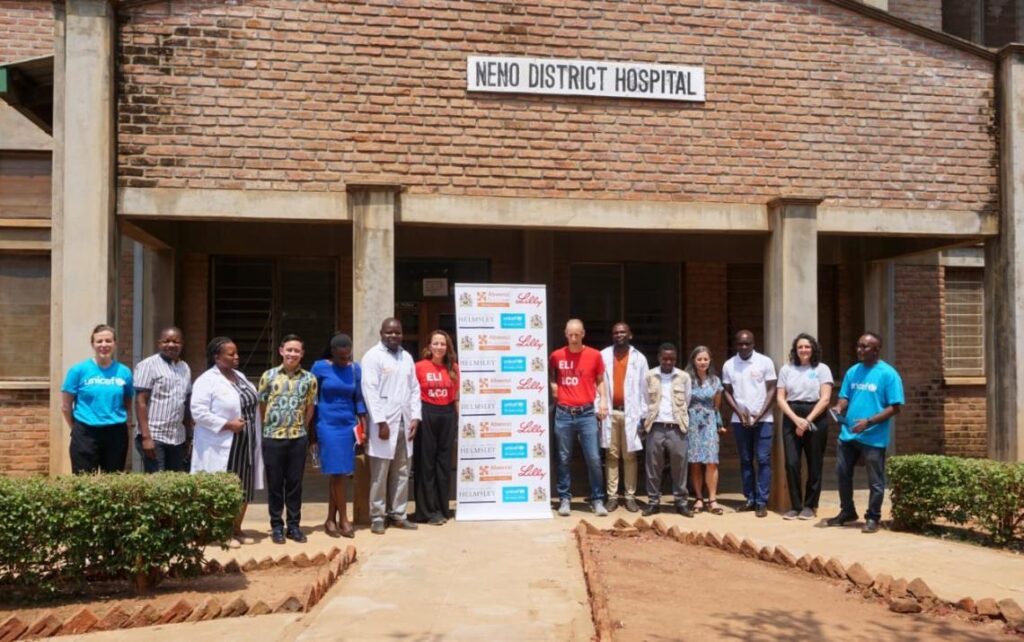…Hospitals need to intensity early screening of non-communicable diseases
By Rogers Siula, UNICEF

Half a decade ago, weight loss, excessive thirst and tiredness completely disrupted Chifundo Joseph’s life at a tender age of five.
“I could not play with my friends and could not match their energy. I would easily get tired and excessively hungry. At the same time, I was also experiencing loss of appetite. I felt isolated,” Chifundo explained.
Days turned into weeks, weeks into months and the situation did not get any better. One day, his parents took off from their Village Head Gonthi, Traditional Authority Mlauli in Neno to Neno District Hospital. This journey was a turning point in Chifundo’s life.
Little Chifundo was put through mandatory screening of non-communicable diseases (NCDs) services that are available at Neno District Hospital and he was diagnosed with type 1 Diabetes Mellitus.
Neno District Medical Officer Dr. Enock Jambo observed that better screening services at the hospital have immensely helped in detecting and treating NCD patients.
“About 40 to 50 per cent of all patients screened have a non-communicable disease. However, the common NCDs in children registered here are sickle cell anemia, diabetes, iron deficiency anemia, obesity, and asthma.
“The earlier the detection the better, however there is a huge knowledge gap that needs to be addressed in the communities in as far as NCDs are concerned. Because of this lack of knowledge, there are a lot of myths associated with NCDs thereby leading to misconceptions and misinformation,” he said.
Since Chifundo was diagnosed, he is surviving on two daily injections of insulin, which are administered by his brother, Samuel Joseph, 22.
According to Samuel, he comes once a month with his younger brother at the hospital for assessment and collection of more insulin.
“When they give us insulin, we store it safe using homemade cold storage solutions in the village. We keep the dosages in a clay pot filled with water and lay it on sand in the house to keep the insulin within the recommended temperature levels.

“The most exciting thing is that Chifundo has improved a lot ever since he started getting insulin. He is active and plays soccer with his peers both at home and at school,” said Samuel adding that officials from Partners In Health (PIH) and the hospital also visit their home to monitor Chifundo.
Type 1 Diabetes Mellitus is an autoimmune disorder. The Centre for Disease Control and Prevention (CDC) highlights that in type 1 diabetes; pancreas does not make insulin or makes very little insulin, which can lead to high blood sugar.
Chifundo is currently in Standard Two at Nkomaliwiro Primary School. He cherishes the support he gets from his teachers as they know his condition.
“I take my recommended foods at school at any time I feel strange. Teachers and my classmates are very supportive. I don’t feel left out but motivated to go to school,” said a smiling, soft spoken Chifundo.
The NCD screening facility is currently on a pilot phase implemented by the Ministry of Health and Partners in Health (PIH) at Neno and Mangochi District Hospitals, supported by UNICEF Malawi with funding from Eli Lilly – an American pharmaceutical company.
In October this year, a delegation from Eli Lilly visited Neno and Mangochi District Hospitals to appreciate their work in screening, treatment and monitoring of NCD patients. Apart from applauding the collaboration by the Ministry of Health, UNICEF Malawi and PIH, the team commended the health care workers’ commitment and contributions, especially monitoring NCD patients in communities.
“It was inspiring to see our joint vision coming to life in Malawi. We met heroic health care providers and partners who are managing and standing up the NCD clinics and the community health networks. We also had the chance to meet several children with life-threatening NCDs who are already benefitting from the programme which was the highlight of the trip.
“As our work is still in its infancy, it was heartening to know how many more children and adults will benefit as well in Malawi. We look forward to advancing our common work together, I am convinced our work will also help spur the global community to greater focus on NCDs as well” said John Steele, Assistant Vice President of Eli Lilly – Diabetes.
In February this year, Eli Lilly and Company and UNICEF announced a new collaboration to help improve health outcomes for 10 million children and adolescents living with chronic, non-communicable diseases through 2025.
Lilly committed US$ 14.4 million in support of UNICEF’s lifesaving work to address NCD risk factors, strengthen health systems, and enhance the ability of health care workers to care for patients in Malawi, Zimbabwe, Nepal, the Philippines and Bangladesh.
Read original article here: https://www.unicef.org/malawi/stories/chance-survive-and-thrive-10-year-old-diabetes-patient

